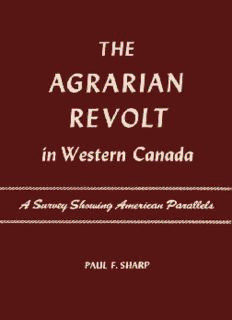
The Agrarian Revolt In Western Canada: A Survey Showing American Parallels PDF
Preview The Agrarian Revolt In Western Canada: A Survey Showing American Parallels
THE AGRARIAN REVOLT IN WESTERN CANADA This page intentionally left blank THE AGRARIAN REVOLT IN WESTERN CANADA A Survey Showing American Parallels by PAUL F. SHARP UNIVERSITY OF MINNESOTA PRESS • MINNEAPOLIS LONDON • GEOFFREY CUMBERLEGE • OXFORD UNIVERSITY PRESS Copyright 1948 by the UNIVERSITY OF MINNESOTA All rights reserved. No part of this book may be reproduced in any form without the written permission of the publisher. Permission is hereby grant- ed to reviewers to quote brief passages in a review to be printed in a magazine or newspaper. PRINTED AT THE NORTH CENTRAL PUBLISHING COMPANY, ST. PAUL To Rosella Anderson Sharp This page intentionally left blank Foreword This study in Canadian-American relations is the outgrowth of a challenge issued some years ago by Professor A. L. Burt in a Canadian history seminar. He pointed out that the story of the North American West has often been approached with a national bias which ignores the parallel development of regions divided by a political boundary. These parallels, born of geography, cli- mate, culture, and economics, have served to pour the societies of the prairie provinces and the American Northwest into much the same mold. This book analyzes the close relationship of the western Canadian farmers' movements to similar organizations in the contiguous wheat belt of the American Northwest as illustra- tive of the larger concept. Canadian historians have paid scant heed to the fundamental similarities in environment that produced the same agrarian pro- tests on both sides of the international boundary. This environ- ment created similar problems of production, transportation, mar- keting, and relations with eastern metropolitan areas. Identical problems stimulated the same reactions from Canadian farmers as from their American neighbors. American historians have often forgotten that the agricultural frontier lingered on in western Canada after it had disappeared in the United States. Thus the influence of a frontier region on American agriculture continued for many years after the Ameri- can frontier had officially passed away. The forty-ninth parallel has been a far more formidable barrier to many historians than to the men and institutions they have examined. The influence of identical environments was reinforced by the ease with which men and ideas crossed the international boundary to the north. The impact of the American republic has been great upon life in every section of the dominion, but nowhere is it more vii AGRARIAN REVOLT IN WESTERN CANADA viii pronounced than in the Canadian West. The American farmers who helped to settle that vast region carried with them an agrarian experience which had matured under the stimuli of similar condi- tions in the American West. Typically western ideas quickly took root in the prairie provinces, where, combined with eastern Cana- dian and British traditions, they flowered in an agrarian revolt that recalls the earlier Populist crusade and parallels the contem- porary agrarian movements in the American Northwest. I am under obligation to many for assistance in this study. Visits to Canada were always a pleasure and a profit owing to the unfailing courtesy of librarians, editors, scholars, and farmers who share my enthusiasm for the history of the Canadian West. I am especially grateful to Dr. D. A. MacGibbon, chairman of the Dominion Board of Grain Commissioners, Mr. R. D. Colquette, one-time editor of the Country Guide, Mr. W. Norman Smith, edi- tor of the Western Farm Leader, and Mr. Leonard D. Nesbitt of the Alberta Wheat Pool. Professors Alice Felt Tyler and Rodney C. Loehr of the Uni- versity of Minnesota, Professor William Lewis Morton of the Uni- versity of Manitoba, and Mr. Everett E. Edwards of the United States Department of Agriculture have read the manuscript and made a number of helpful suggestions. And I am under constant obligation to Professor A. L. Burt of the University of Minnesota under whose direction this study was originally begun as a doc- toral dissertation. PAUL F. SHARP Ames, Iowa Contents I. THE LAST BEST WEST 1 II. THE FARMER'S BURDEN 21 III. "ORGANIZE! 0, ORGANIZE!" 32 IV. THE PREWAR CRUSADE FOR DEMOCRACY . . .. 54 V. THE NONPARTISAN LEAGUE INVADES CANADA . 77 VL THE NONPARTISAN LEAGUE IN PRAIRIE POLITICS 91 VII. THE WAR YEARS 105 VIII. REVOLT ON THE PRAIRIES 128 IX. THE FARMERS IN POLITICS 152 X. THE PROGRESSIVE HERITAGE 179 BIBLIOGRAPHY 193 INDEX 199 ix
